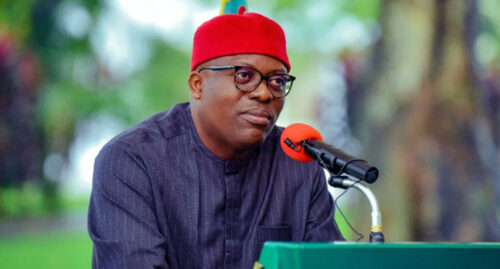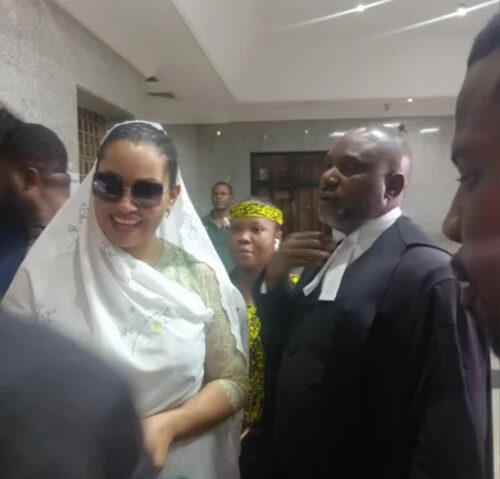Oyo State Governor, Seyi Makinde, on Thursday inaugurated the Oyo State Council of Obas and Chiefs after 15 years, with the Olubadan of Ibadan, Oba Rashidi Ladoja, emerging as its first chairman.
The Alaafin of Oyo, Oba Akeem Owoade, was conspicuously absent from the inauguration, which was held at the House of Chiefs, Parliament Building, Secretariat, Ibadan.
At the inauguration, Governor Makinde explained that the chairmanship of the Oba council will be rotated among the Olubadan, Alaafin and the Soun of Ogbomoso.
According to him, it was an agreement reached at a meeting with the three first-class monarchs.
But in a swift statement on Thursday by his media aide, Bode Durojaye, the Alaafin countered the governor, saying there was no such meeting.
The statement read: “The attention of the Alaafin’s palace has been drawn to a statement credited to His Excellency, Governor Seyi Makinde that he consulted with the three traditional rulers in the state, the Alaafin, the Olubadan and the Soun of Ogbomoso on the rotational Chairmanship of the State Council of Obas and Chiefs.
“The palace hereby wants to state clearly that there was no time that His Imperial Majesty, the Alaafin of Oyo, Oba Engineer Abimbola Akeem Owoade 1, held any meeting with either the state governor or any of the two traditional rulers mentioned above.
“Also, the Alaafin did not tell the governor or make a categorical statement on his endorsement of rotational chairmanship among the three traditional rulers in the state.
“The position of the Alaafin and the entire Oyo community on the general issue of the, state, Council of Obas, and Chiefs has been enunciated in a Memo delivered to His Excellency by the Oyo Council of Elders.”
Thursday’s inauguration came amid rumours of a feud between the Alaafin and Oba Ladoja.
A viral video circulating on social media recently showed the Alaafin appearing not to rise to greet Oba Ladoja at a public function, while the Olubadan was also seen seemingly declining the Alaafin’s handshake.
But speaking with journalists in Ibadan on Thursday, Oba Ladoja debunked claims of any rift with Oba Owoade.
Speaking during the inauguration, Makinde said the chairmanship of the council would be rotational among the Olubadan of Ibadan, the Alaafin of Oyo, and the Soun of Ogbomosoland, with each monarch serving a two-year term.
According to the governor, the arrangement was designed to promote unity, harmony, and cooperation among traditional institutions in the state.
Makinde said, “No matter how hard an issue is, we will definitely resolve it. My three fathers, the Alaafin of Oyo, the Kabieyesi Olubadan and the Kabieyesi Soun, and the agreement is that they will start the rotation with the Olubadan of Ibadan land.
“So, on that basis, I hereby pronounce the Oyo State Council of Obas and Chiefs inaugurated, in person of Kabieyesi Olubadan of Ibadan land, for two years. The council, like the commissioner mentioned, last met like this in 2011. And we’ve been on this for a while. I mean, I’ve been here for close to seven years now.
“It will be seven years exactly in May 29 that this administration came into office. And the easiest thing for me to do, or for this administration to do, is to encourage a division. You know, when they say divide and rule, that is the easiest thing.
“But we know that some of the things that we have been able to achieve as an administration, they can be traced to our traditional institutions. You come to me, we discuss, we rub minds on what is happening in our various communities.
“I get most of that information from you. And then we thought, is it not a shame that for 15 years running now we don’t have a Council of Obas and Chiefs? And if we don’t have a council, how do we play an active role as a state?
“At best, what we have will be an ad hoc arrangement, which is what has been happening since 2011. I’ve been here since 2019. So I encouraged the House of Assembly, and I consulted widely amongst the traditional rulers.
“I mean, if we look at this, this is House of Chiefs. We cannot see any improvement. We only come here for a few events. But our traditional institutions must be strengthened. The AC is not working because nobody is in charge. There’s no one telling us, calling the state government on this. We signed the law passed by the state House of Assembly, and I signed it on August 14, 2025.”
In his remarks, Oba Ladoja urged the public to have confidence in the council, describing the inauguration as the beginning of work rather than an achievement.
“The primary responsibility of the council is to ensure peace and safety across their domains while contributing to the continued progress of the state,” he said.
Ladoja stressed that public confidence in the council would grow after its first meeting, as residents would see that members were united in purpose rather than competition.
He said, “We appreciate the goodwill and congratulations we have received. This inauguration is not an achievement in itself; it marks the beginning of serious work. After our first meeting, people will begin to have confidence in us, because they will see that we are not in competition with one another. We are not here to fight or to pursue personal interests, so there is nothing to fear.
“Our sole concern is to ensure that our domains remain safe and peaceful, and that the state continues on the path of progress. We want the state to be a good place for everyone. That is the purpose of this council. This is not about any individual; it is about bringing people together and working collectively for the common good.”
Earlier, the Commissioner for Local Government and Chieftaincy Matters, Ademola Ojo, described traditional rulers as custodians of culture and communal harmony who have remained pillars of peace, moral authority, and grassroots development.
He said, “As we formally inaugurate this council, it’s my earnest hope that it will remain a beacon of harmony, a forum for constructive dialogue, and a strong partner in our shared quest for peace, security and socio-economic advancement.”
Also on Thursday, Oba Ladoja dismissed claims that he deliberately snubbed the Alaafin during an interfaith gathering held in Ibadan on Monday.
Speaking with journalists, the Olubadan described the allegation as a misunderstanding that had been exaggerated on social media.
He said, “There was no intention whatsoever. What happened was not deliberate. It has been misinterpreted, particularly on social media.”
Recall that a video circulated online suggesting that the Olubadan snubbed the Alaafin during the 2026 Inter-Faith Gathering held at the Grand Space behind the Oyo State House of Assembly.
Explaining his actions, Ladoja said he arrived late at the event and tried to take his seat quietly without disrupting proceedings.
He said, “When I go late to a place, I try to bring good news. Just like at the mosque, when prayers are ongoing, you wait until people are properly arranged before joining. I was trying to take my seat before anyone would say I could no longer move.”
According to him, seating arrangements and changes in positions of dignitaries affected his movement within the hall.
“My seat was between the Soun and the Alaafin. I had to pass through some people to get there. I did not take any decision to avoid or ignore anyone. Why should I?” he said.
The Olubadan expressed concern over what he described as deliberate mischief by some commentators.
“If you watch the full video, you will see that I greeted people, including the governor. But social media often takes things out of context.”
On whether he had addressed any perceived grievances, Ladoja insisted there was no tension between the traditional institutions.
He said, “I don’t believe anyone was being offensive, and I do not see the issue as an insult to anybody. My focus is to unite the present generation and those coming after us. We must raise standards, especially in education, and concentrate on what truly brings progress to our society.”


 BIG STORY2 days ago
BIG STORY2 days ago
 BIG STORY3 days ago
BIG STORY3 days ago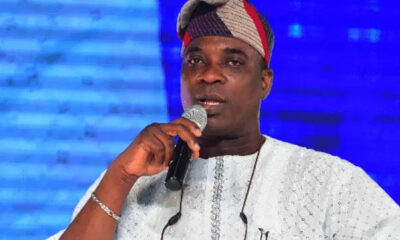
 BIG STORY4 days ago
BIG STORY4 days ago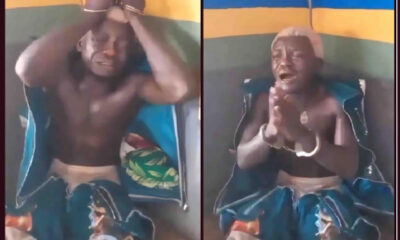
 ENTERTAINMENT3 days ago
ENTERTAINMENT3 days ago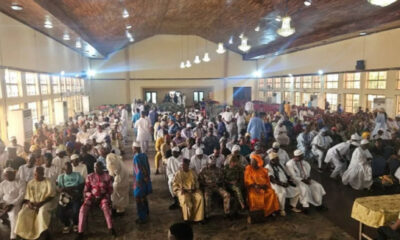
 BIG STORY3 days ago
BIG STORY3 days ago
 BIG STORY4 days ago
BIG STORY4 days ago
 BIG STORY1 day ago
BIG STORY1 day ago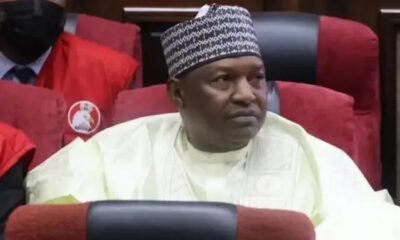
 BIG STORY4 days ago
BIG STORY4 days ago


















